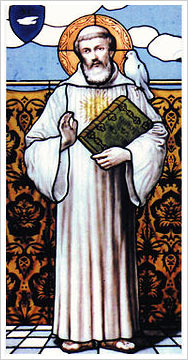“The Patron Saint of all those who now seek to build a United Europe” – Robert Schuman
History
We have named the firm after St. Columbanus who emerged from the austerity of Celtic Christianity to become one of the most outstanding sources of cultural, educational, and spiritual renewal in Europe, which was struggling to create a new unity from the many regional conflicts resulting from the collapse of the Roman Empire in the 5th and 6th centuries.
St. Columbanus was born in 543 in County Meath, Ireland, and died in Bobbio, Italy, on 23 November 615. During his journey from Ireland to Italy, he and his followers had established numerous monasteries in France, Switzerland, Germany, Austria, and Italy, which became strongholds of safety, education, employment, and culture amidst the turmoil of the Dark Ages.
His work across Europe has left a lasting legacy. Robert Schuman, a founding father of the EU and the first President of the European Parliamentary Assembly, considered him an inspiration for modern Europe, stating on 23 July 1950 in Luxeuil, France, “St. Columban, this illustrious Irishman who left his own country for voluntary exile, willed and achieved a spiritual union between the principal European countries of his time. He is the patron saint of all those who now seek to build a United Europe.”
Today St. Columbanus is still invoked by European politicians as a model and a patron for European solidarity. On 27 April 2004, on the eve of the accession of the 10 new member states, the President of the European Parliament, Mr. Pat Cox, made a pilgrimage to the shrine of St. Columbanus in Italy. In his public address, Mr. Cox hoped that this Irish monk would be an inspiration for common values and cultural unity within Europe and declared his personal support to have him named as Patron of the European Union.
Amidst the current financial and economic crisis St.Columbanus AG also looks for the roots of renewal that can help revive Europe and set it upon a strong and stable foundation for future growth. It is for this reason that we have taken as our namesake a European, who in his own troubled times found solutions to overcome Europe’s political disunity and economic and cultural challenges, in the process leaving a lasting legacy of hope for us to follow.





